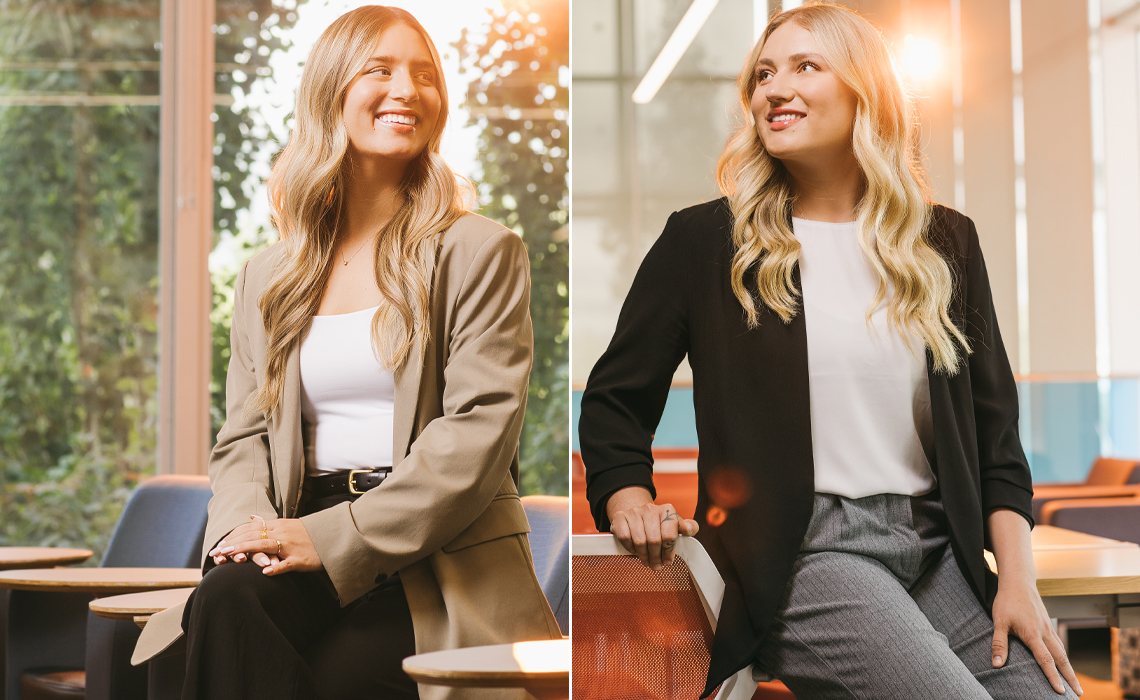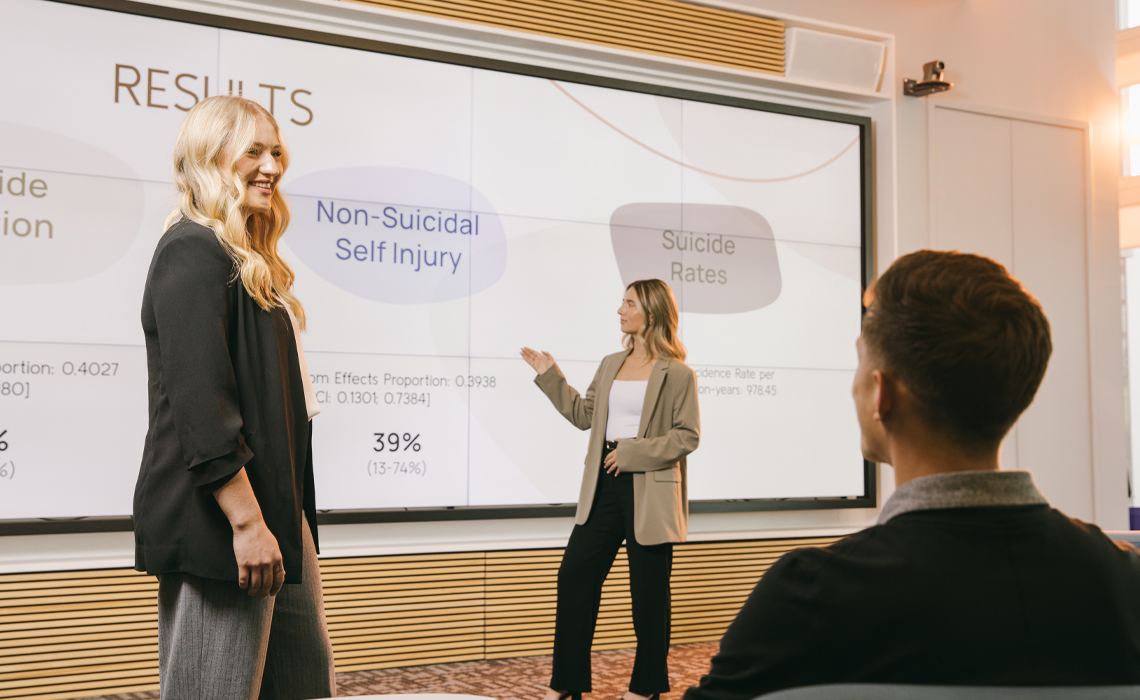Lessons learned, friendships forged and futures launched

Tia McNeil and Katilin Berlinguette are both recent graduates of Mount Royal’s Bachelor of Arts – Psychology major. They came to Mount Royal in the fall of 2021 as complete strangers from different parts of the province. Due to the pandemic, their classes were online in their first two years but McNeil says she kept seeing Berlinguette’s name pop up online. Eventually learning together in person in their third year, a statistics class would bring them closer and their friendship continued to blossom.
The pair began working in the Centre for Psychological Innovation together, igniting their passion for research. They would end up presenting at conferences alongside one another and were able to help each other as they both wrote their honours thesis. Ultimately, they were able to cross the stage together in June of 2025. On campus one last time together they shared more about their journey at MRU.
TM: Like many others, my first year was anything but typical. The pandemic hit in 2020, and I found myself starting university in a brand-new city, with no in-person classes and few social connections. I had never even visited the campus before moving to Calgary. But my roommate and I found comfort in the fact that we were figuring it all out together, and that shared experience brought us closer.
KB: My first two years at MRU were entirely online, which made for a challenging adjustment. I quickly realized my high-school study habits were not adequate for the university level, and I struggled with imposter syndrome. As the first in my family to pursue a degree, I often questioned whether I belonged. With the guidance of Dr. James Taylor and Dr. Tamara Jenkins, I built new learning strategies and gained the confidence I needed to grow academically and personally. I also received amazing support from professors who directed me to Student Learning Services, which helped immensely.
TM: My interest in research really took off when I took Research Methods with Dr. Daniel Devoe. His passion for psychology and his ability to make complex concepts engaging left a lasting impression. He created an environment where curiosity was encouraged and learning felt exciting, which sparked my desire to get involved in research myself.
KB: I began with an interest in counselling, however, after taking Dr. John Streukins’ psychopathology course, I was drawn to clinical psychology and the study of abnormal behaviour. Dr. James Taylor encouraged me to explore graduate options early, and I later joined his lab — an experience that sparked my passion for research. In my third year, I joined Dr. Giuliana Harvey in the nursing faculty on a six-month contract, which turned into a three-year research and publication collaboration.
TM: In my second year, I reached out to Dr. Devoe and was welcomed into the Devoe Brain and Mental Health Research Lab. Right from the start, I was encouraged to take an active role. I helped with another student’s project and soon after had the opportunity to present my own research at MRU’s Research and Scholarship Days. It was an amazing entry point into the research community.
KB: I said ‘yes’ to every research and experiential opportunity I could. Through MRU’s work-integrated learning courses, I worked with three non-profit organizations, gained summer jobs and built a stronger resumé. The honours program was a pivotal experience — under Dr. Dan Devoe’s mentorship, I led a major research project for my thesis, which opened doors to conferences in Vancouver, Japan and at the Foothills Hospital, all supported by MRU funding.
TM: I’ve been incredibly fortunate to work in a lab filled with passionate, driven students. Over the past three years, I’ve attended and presented at the Mathison-Littmann Research Conference at the Foothills Hospital, which has been an amazing opportunity to connect with local professionals and listen to incredible new research. One of my proudest moments was presenting at the Eating Disorders Association of Canada conference in Vancouver. Being surrounded by professionals doing such impactful work was incredibly inspiring. I also had the honour of presenting my honours thesis at the Psychology in the Military & Royal Military College of Canada conference, which was a deeply meaningful experience given my personal connection to military life.
KB: Research has taken me around the world and into published journals. It’s been rewarding to contribute to the field of mental health and see the value of my work, even as an undergraduate. My research on suicidal behavior in individuals with eating disorders has informed screening protocols and supports safer practices for at-risk populations.

TM: Much of my research has focused on eating disorders, which are disproportionately experienced by women and often misunderstood or under-discussed. For my honours thesis, I shifted focus to explore suicidality among military personnel. Given my background in a military family, this was a deeply personal area of study. I believe this type of research is essential in improving awareness, reducing stigma and ultimately creating better mental-health supports for those who serve. Contributing to better understanding and support in both of these areas has been incredibly rewarding.
KB: The rise of social media has contributed to the growing prevalence of eating disorders, especially among adolescents. I was naturally drawn to this area of study and hope to continue contributing through future research and clinical work.
TM: My time at MRU has been truly transformative. I’m the first person in my family to graduate from university, and I feel incredibly grateful for the supportive environment that allowed me to grow, not just academically, but personally. This experience has shaped who I am and reaffirmed my passion for contributing to the mental-health field.
KB: Thanks to the support of MRU’s psychology department over five years, I’ve grown immensely. I plan to pursue a master’s in clinical psychology with a focus on pediatric chronic pain. While my interests remain broad, I’m excited to explore the field further. I currently work at a seniors' residence as a life enrichment coach supporting residents with dementia and continue to volunteer at the Alberta Children’s Hospital on research projects and social-media initiatives.
TM: Moving forward, I plan to continue making a difference through both research and volunteer work, while pursuing a career that allows me to support others in meaningful ways. The foundation I built at MRU, especially through hands-on research, mentorship and a strong academic community, has equipped me with the tools and confidence to take that next step.
KB: The experience and CV I’ve built have positioned me as a strong applicant for graduate programs and employment. After convocation, I’ve taken time to travel and recharge — but my passion for academia remains. MRU made my undergraduate journey extraordinary, and I’m excited to see the honours program and student research opportunities continue to grow.
TM: I learned the importance of building a support system. University can be overwhelming at times, especially when you're far from home or dealing with uncertainty. What got me through were the connections I made with peers, professors, and mentors. I learned that asking for help, showing up for others, and letting people show up for you is just as important as anything you study. Success in university isn't something you achieve alone, especially when struggling through statistics. Those relationships turned a challenging experience into something meaningful and memorable.
KB: University taught me that while classroom learning is important, real growth happens when you take initiative. Grades matter, but applying your knowledge in diverse, hands-on environments is what truly deepens your understanding. I strongly encourage students to attend conferences — even just as listeners — to get inspired by the groundbreaking work happening in our community.
TM: If you're considering the psychology program at MRU, I would say go for it. The program offers so much more than just textbooks and lectures. You’ll find supportive faculty, opportunities for hands-on research as well as work-integrated learning and a real sense of community. It’s a place where you’re seen, supported and encouraged to grow in ways you might not expect. When I talk to friends from other universities, they’re often surprised that my professors knew my name or noticed when I wasn’t in class. I’ve had professors wait to start a lecture because I was running late to a four-person seminar, and the amazing Dr. James Taylor even gave me a chocolate bar with my midterm because it fell on my birthday. Little moments like that meant so much to me and really show the kind of care and encouragement students receive here. The people at MRU make it a truly positive, uplifting place to learn and grow.
KB: MRU’s psychology program is outstanding, offering a broad range of courses across the field. I was surprised to find myself enjoying statistics after initially fearing it. To future students: stay open-minded, get involved and don’t be discouraged if one opportunity doesn’t work out — another one will. Even if you’re busy, volunteer or apply for summer positions. Every experience adds value and can lead to paths you never imagined. Most of all, enjoy the process — it goes by faster than you think.
If you or someone you know needs help, contact the appropriate support services. Support is available through Wellness Services and the Distress Centre Calgary.

